Garlic companion planting – the best plants to grow alongside it, plus what to avoid
Help combat pests and diseases in the garden by utilizing the extensive benefits of garlic
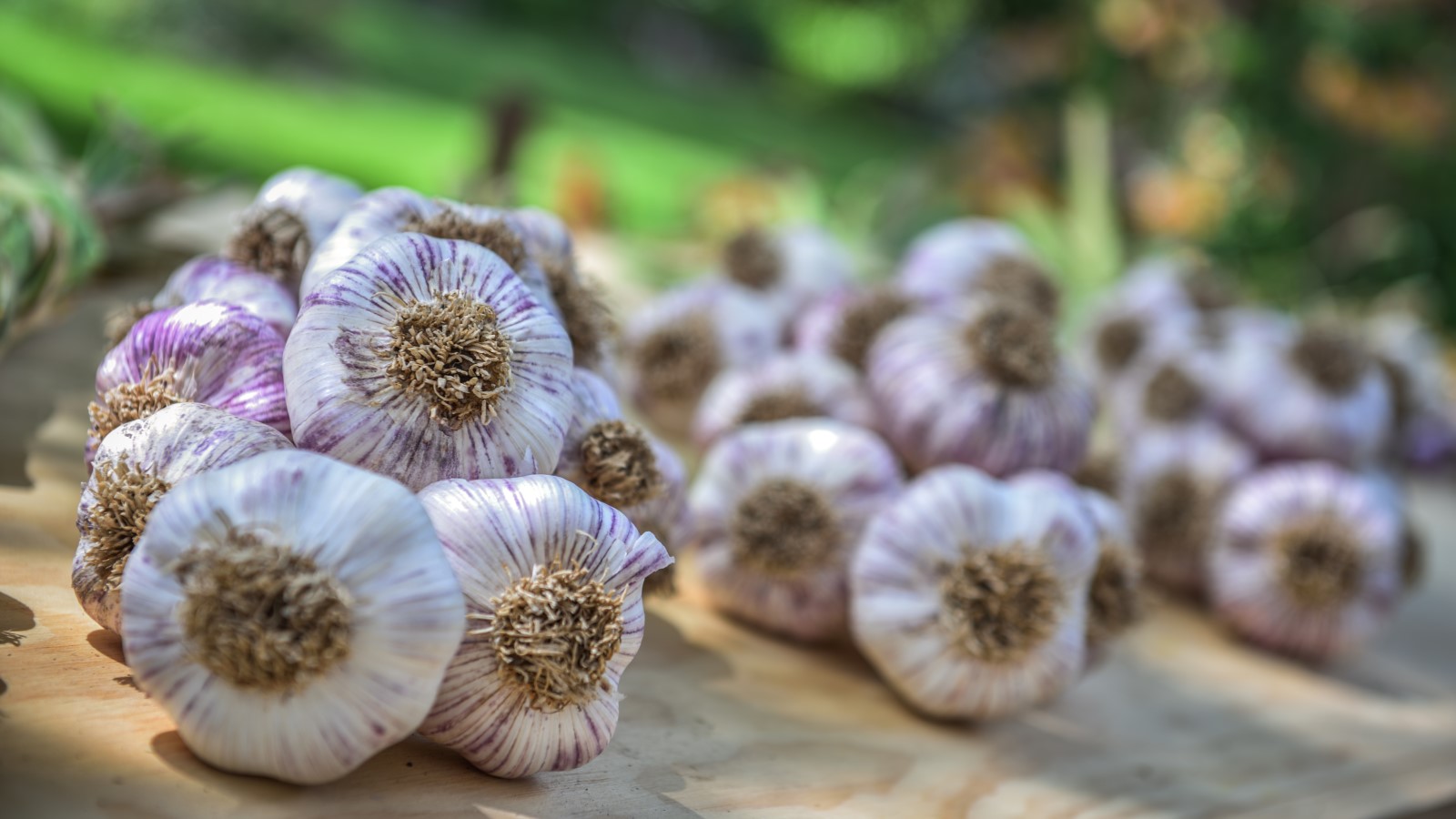

Garlic companion planting can help keep pests and diseases away from vegetables, fruit, and even flowers, including roses. Its pungent aroma actively repels many pests that can attack crops, and it produces a natural fungicide in the soil. Nearby plants can absorb this into their roots and it protects them from fungal infections.
Companion planting is a really effective way to organically control pests in the garden and also supplement both growth and flavor in some edibles. Utilizing companion planting also reduces the need for using chemicals in the garden.
If you are learning how to grow garlic, then it really pays to consider the best companion plants to grow around it and take advantage of all the benefits that companion planting offers.
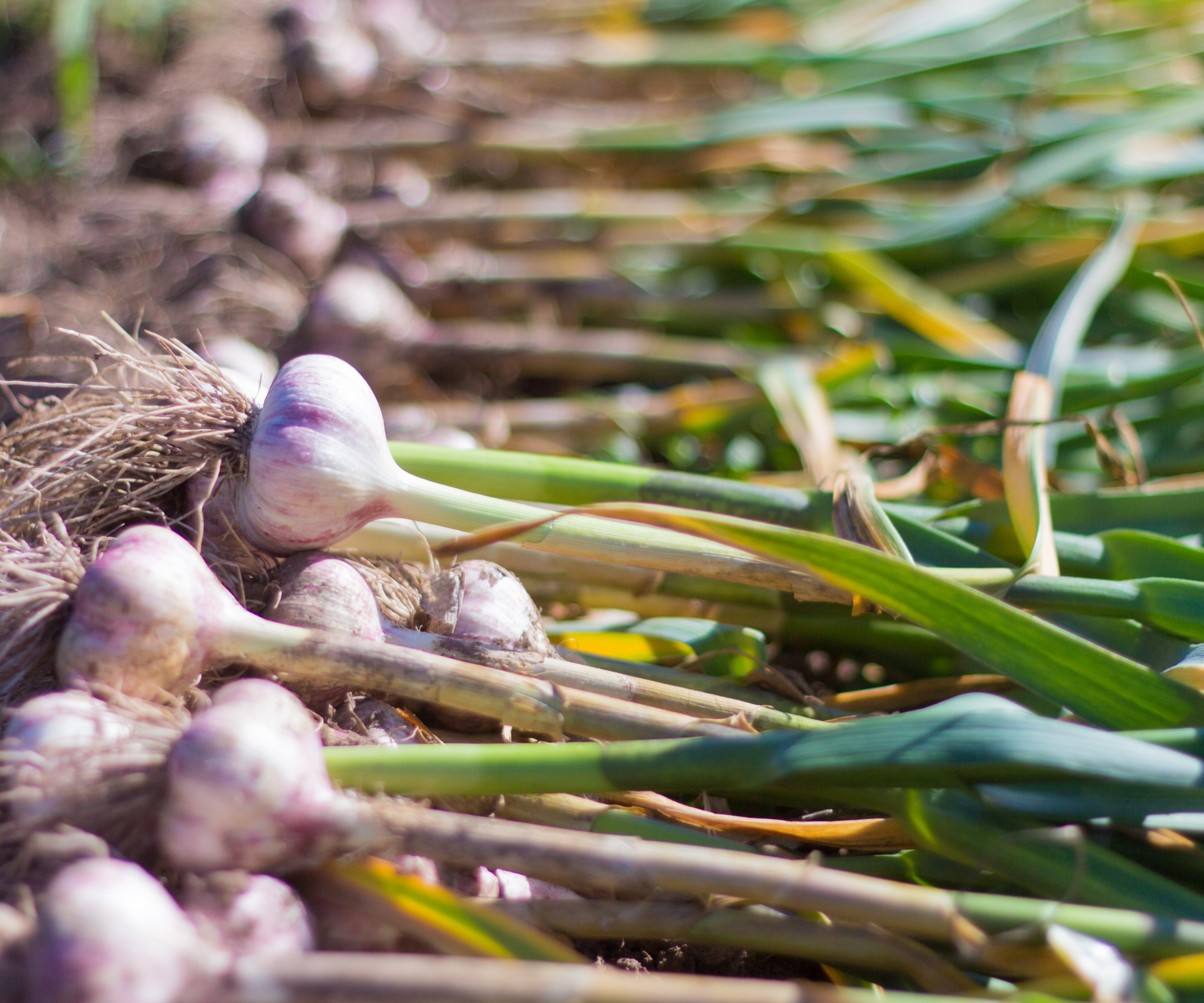
Garlic can deter a whole range of pests, from aphids to deer

Drew is a former professional gardener who specialized in growing vegetables for restaurants. He previously worked in certified organic kitchen gardens and, wherever he has gardened, always grew edibles to organic principles.
Benefits of garlic companion planting
One of the main advantages of companion planting with garlic is the pungent smell the plant emits. Whether you are growing hardneck or softneck garlic, it is a natural pest and fungus repellent and that makes it a fantastic companion plant in the garden.
Common garden pests including aphids, ants, snails, gnats, and moths all detest the smell of garlic. Even larger pests, such as rabbits and deer, can be put off from munching on crops by the powerful smell emitted from garlic planted in close proximity.
Gardeners around the world make homemade garlic sprays, or buy garlic insect-repellent sprays such as Garlic Barrier on Amazon, to take advantage of the power of garlic when it comes to deterring pests.
On top of protecting from pests, planting garlic can also play a role in disease prevention. Garlic can actually help prevent fungal infections on plants as it contains sulfur that can eliminate fungus. Plants growing near garlic benefit from absorbing that sulfur into their roots – and this reduces the likelihood of fungal infections hitting them.
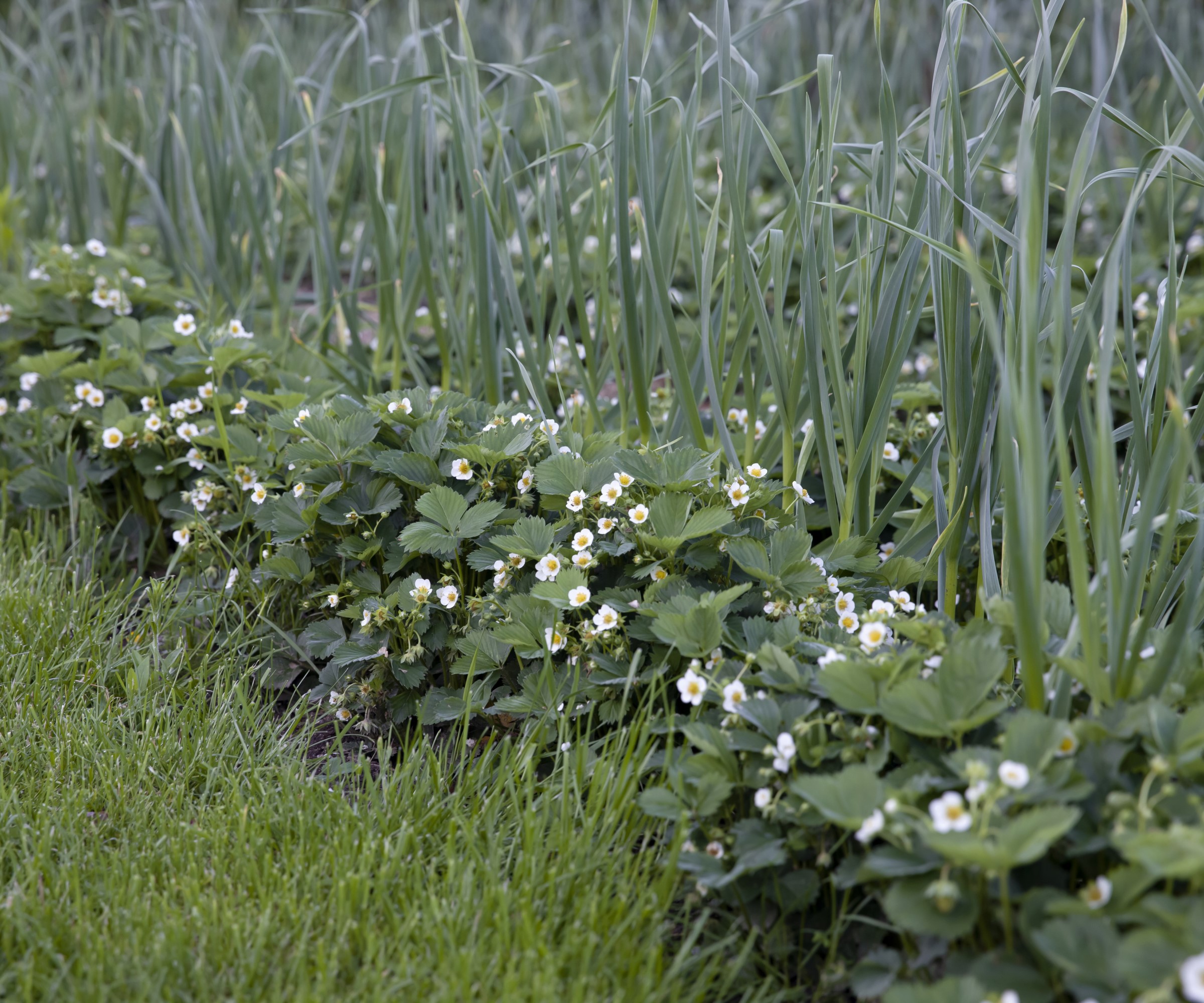
Garlic can keep mites off strawberry plants
Top crops for companion planting with garlic
Garlic is a fantastic crop for companion planting as it has a long list of plants that can benefit from being a neighbor. This includes not only other vegetables, but also fruit, herbs, and even ornamental plants.
Cristian DeRusha, Farm Director at Arden Farm in Florida, describes the list of beneficial companion plants for garlic as ‘extensive’ and claims that, on top of deterring pests and disease, the crop also helps result in bumper harvests as it can attract pollinators into the garden.
‘Garlic is relatively low-maintenance and takes up very little space in your plot, which means it will thrive next to plants with more specific growing needs and even help increase their flavor,’ says Cristian.
- Vegetable companion plants ‘You should plant garlic near vegetables, like beets, potatoes, carrots, eggplants, tomatoes, peppers, cauliflower, and broccoli,' says Cristian. This is because garlic repels many of their predators. 'Leafy greens like cabbage, lettuce, arugula, spinach, and kale also thrive near garlic because they don’t compete for nutrients.’ So make sure you add it to your list of kale companion plants and potato companion plants.
- Fruit tree companion plants Fruit trees can benefit from being planted near garlic as pests, including caterpillars, aphids, and borers, are repelled by the garlic smell. Garlic can also help protect apple trees from scab and peach trees from developing peach leaf curl. This is all on top of the fact that it can help attract pollinators to boost the tree’s fruit crop.
- Flower companion plants Garlic also offers benefits to flowers, so could potentially be worth considering giving a space in a cottage garden border or flower bed. Garlic is very beneficial to roses as it both deters aphids and helps against rose black spot. Garlic is also said to help grow larger and stronger roses, and increase the fragrance of the flowers. Geraniums, marigolds and nasturtiums are also good companions for garlic as it can help repel their pests too.
Garlic bulbs for planting are readily available online at Burpee, Amazon and Nature Hills.
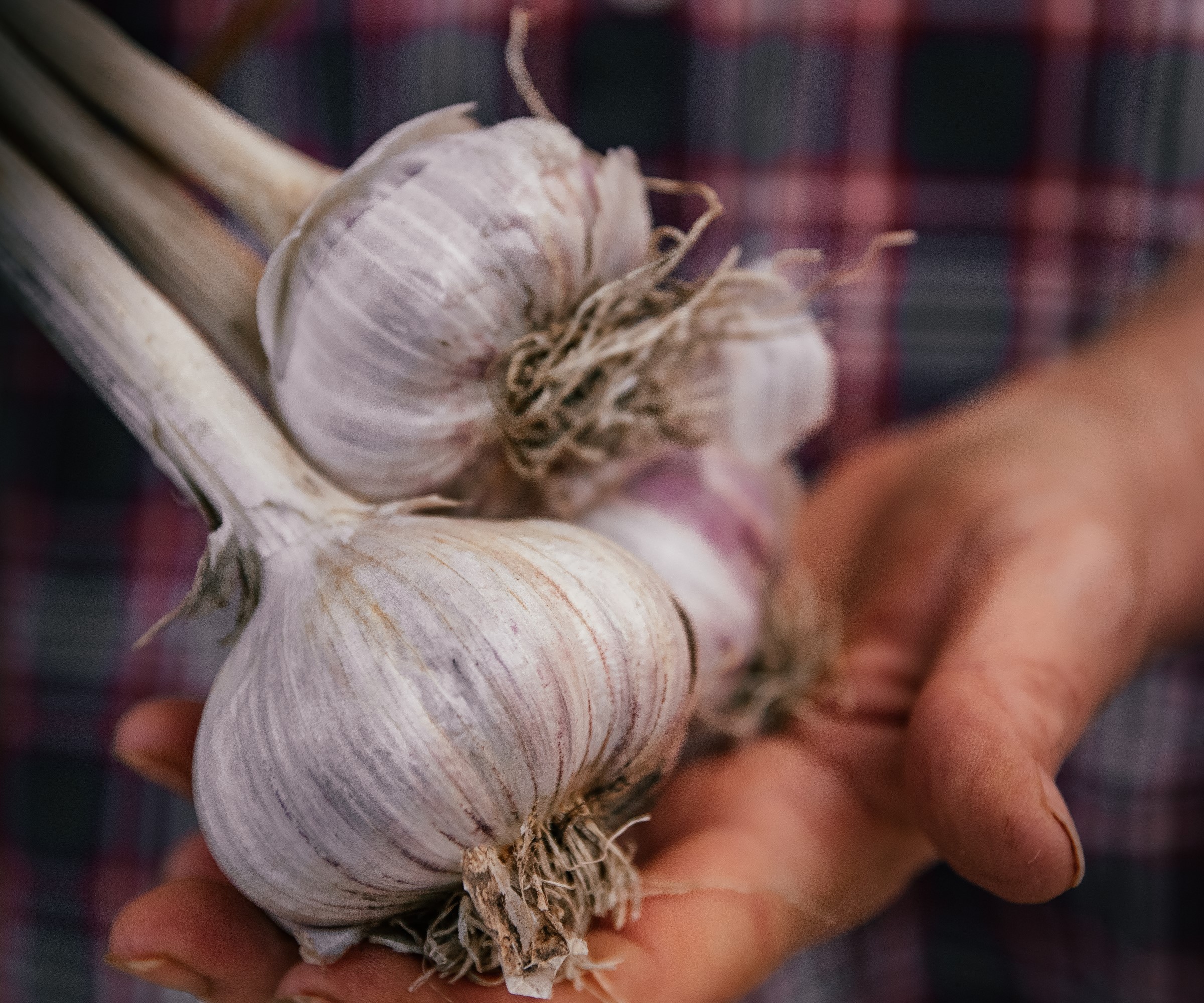
Companion planting can help garlic grow bigger bulbs
Garlic companion plants to avoid
There are lots of plants that will be very happy when grown near to garlic, though there are also some that will not thrive and can be negatively affected by being grown in the vicinity of garlic. If you are planning a kitchen garden and intend to grow garlic, then it is worth remembering not to plant any of them close to your bulbs.
Jen McDonald, organic garden specialist and co-founder of Garden Girls, knows garlic has ‘many advantages’ as a companion plant but warns of the plants that are best kept away from the crop. She advises: ‘Peas, beans, melon, and asparagus should not be planted next to garlic, as the potent garlic will actually stunt its neighbor’s growth.’
It is recommended to not plant garlic too close to other alliums, including onions and leeks, as it can encourage onion maggots into the area. There are plenty of other suitable onion companion planting options, however, if you are growing these crops.
There are also claims that garlic can inhibit the growth of strawberries, however, garlic can actually offer advantages as a strawberry companion plant as it deters spider mites and fungus from the fruit plants.
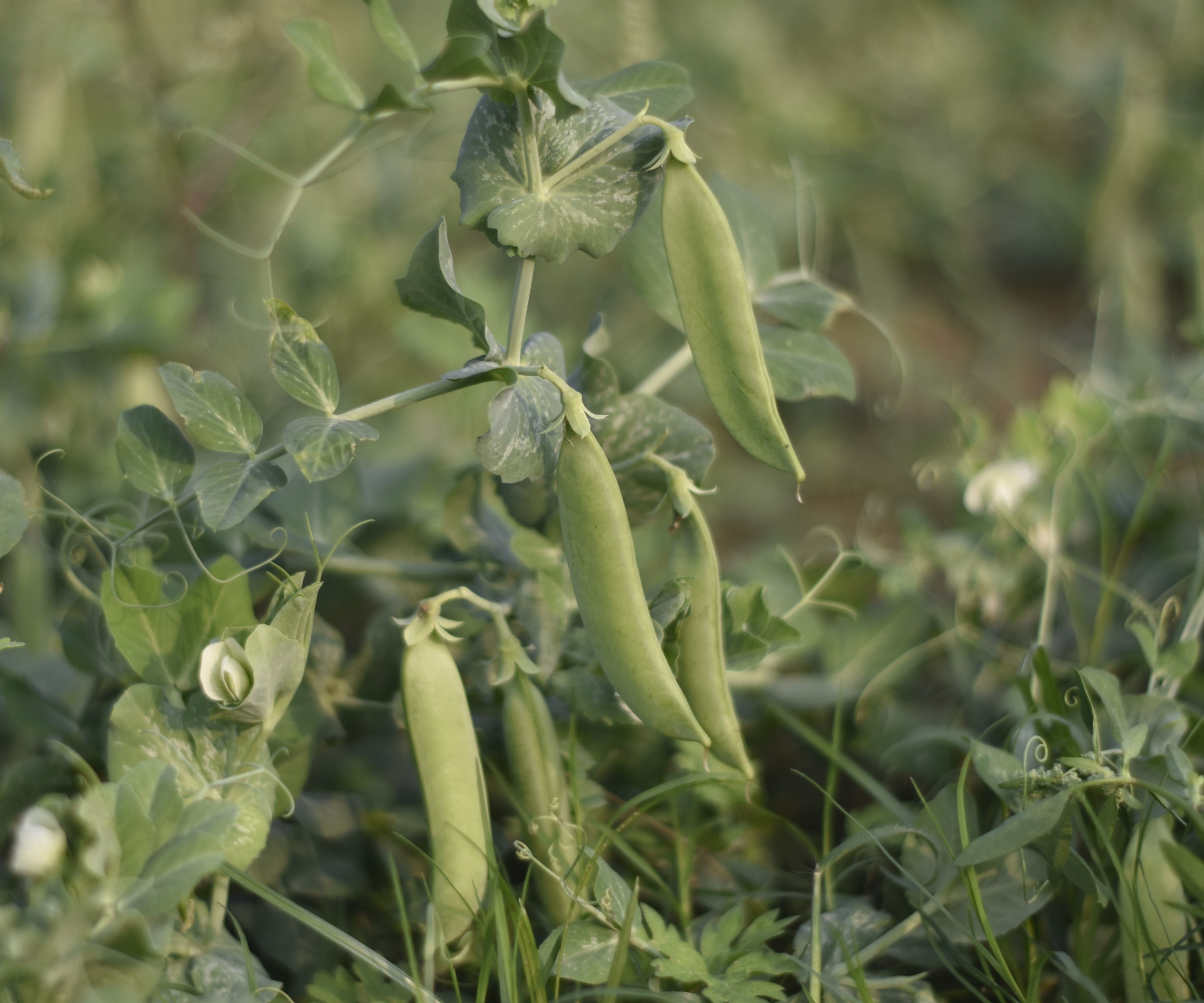
Peas are not a good companion plant for garlic
FAQs
What herbs can I plant with garlic?
There are some herbs that will thrive near garlic, and those that will not. If you like growing garlic and are thinking of potential herb garden ideas, it pays dividends to know the relationships the plant can have with herbs in the proximity.
Growing garlic near yarrow or tarragon will increase the plant’s growth and boost its health, while planting garlic near chamomile will improve the bulb’s flavor. Dill is another herb with a great relationship with garlic. The bulb’s smell will repel aphids from attacking dill, and the dill in turn will enhance the flavor of garlic bulbs. Garlic also benefits from being planted near rue, as the potent smell of rue repels onion flies that can attack the garlic bulbs.
On the contrary, garlic can have a negative impact on some herbs. It is a plant that stunts the growth of both sage and parsley as they will compete with each other for the same resources in the soil. It is a lose-lose and will mean smaller bulbs when it is time to harvest garlic and also stunted herb plants.
What should I add to my soil before planting garlic?
Garlic likes well-drained and moderately fertile soil. Before planting, work some compost or well-rotted manure into the planting site to improve drainage and boost the nutrient levels of the soil. Garlic can be planted either in fall or spring. The addition of amendments prior to planting hardier forms of garlic in the fall means no additional fertilizer would be required until the spring. Any manure added to the site needs to be well-rotted as fresh manure is capable of burning plant roots.
What is the best cover crop for garlic?
Cover crops, also known as green manures, are plants that are grown with the intention of being turned into the soil. This is a common practice in crop rotation and can boost the fertility and organic matter level of soils. Good cover crops to plant before garlic include buckwheat and alfalfa. These summer-growing green manures can effectively suppress weeds and add nutrients and organic matter to the soil.
Sign up to the Homes & Gardens newsletter
Design expertise in your inbox – from inspiring decorating ideas and beautiful celebrity homes to practical gardening advice and shopping round-ups.

Drew’s passion for gardening started with growing vegetables and salad in raised beds in a small urban terrace garden. He has worked as a professional gardener in historic gardens and specialises in growing vegetables, fruit, herbs, and cut flowers as a kitchen gardener. That passion for growing extends to being an allotmenteer, garden blogger, and producing how-to gardening guides for websites. Drew was shortlisted for the New Talent of the Year award at the 2023 Garden Media Guild Awards.
-
 How to clean a patio – 6 different methods, and when you must use a chemical cleaning agent
How to clean a patio – 6 different methods, and when you must use a chemical cleaning agentFrom manual scrubbing, natural solutions or calling in the pros, industry experts reveal the benefits and considerations of each method
By Andy van Terheyden Published
-
 Kris Jenner's favorite air fryer, the Ninja Crispi, is the perfect small kitchen solution – it deserves a place on the most compact of countertops
Kris Jenner's favorite air fryer, the Ninja Crispi, is the perfect small kitchen solution – it deserves a place on the most compact of countertopsKris approves of this compact yet powerful air fryer, and so do our own kitchen appliance experts, praising it for its multifunctionality
By Hannah Ziegler Published